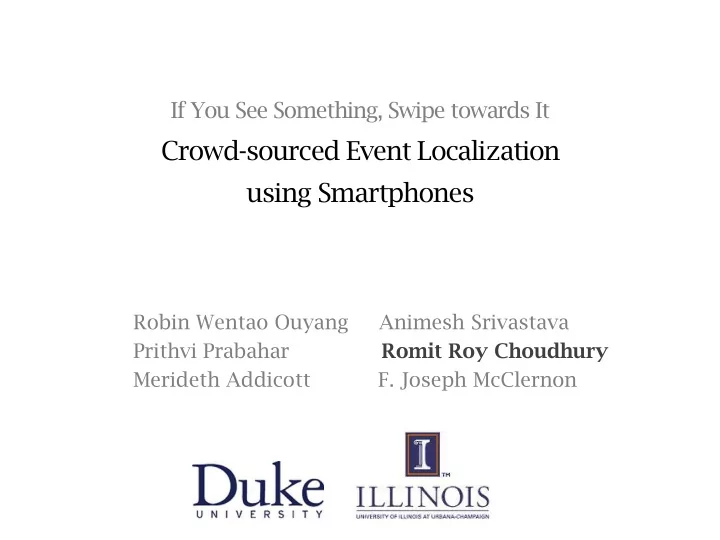

If You See Something, Swipe towards It Crowd-sourced Event Localization using Smartphones Robin Wentao Ouyang Animesh Srivastava Prithvi Prabahar Romit Roy Choudhury Merideth Addicott F. Joseph McClernon
Smoking Location = <x, y>
Crowd-sourced Heatmap
Core Problem Statement Given n smartphone swipes in a given area … compute the location of one or multiple objects/events
Core Problem Statement Given n smartphone swipes in a given area … compute the location of one or multiple objects/events Swipe = < Device location + Compass direction + Swipe direction >
Not Trivial 10 m
Challenges Phone location erroneous Due to GPS errors Phone orientation erroneous Due to compass offsets, ambient magnetic fields Human swipe directions Imprecise due to quick action Perhaps even walking/commuting while swiping Swipe event correspondence Which swipe is for which event?
iSee: Architecture iSee Server Grid-based Basic Data event Analysis localization Cloud Temporal analysis and location refinement Event locations & time Screen GPS Compass Accl. Swipe Time
Basic event analysis Represent each swipe as a trapezoid To capture GPS uncertainty and compass/swipe angle error Swipe intersection * Trapezoid intersection L 3 L 2 L 1 T 2 T 3 T 1 Trapezoid
Basic event analysis Project each trapezoid onto grid cells • Which cell centers are inside • Independent processing • Linear complexity Swipe-cell indicator matrix Cell c 1 c 2 c 3 Swipe s 1 1 1 0 s 2 1 0 0 s 3 0 1 1
Grid-based Event Localization (GEL) Filtering Connected componen Local t Max
Temporal analysis Match swipes to hotspots Hierarchical clustering in termporal domain (with refinement) Event occurrence interval estimation c 1 c 2 c 3 s 1 1 1 0 Spatio-temporal s 2 1 0 0 clusters s 3 0 1 1 Swipe-cell indicator matrix
Location Refinement Swipes to hotspot correspondence complete Optimize swipes for better localization Minimize weighted GPS errors + angular errors Weights = Function (GPS confidence) Formulation
Location Refinement Swipes to hotspot correspondence complete Optimize swipes for better localization Minimize weighted GPS errors + angular errors Weights = Function (GPS confidence) Estimated location True location
Implementation User interface
Experimental Setup Area = 400 x 550 m 2 Manually plant and remove 20 red flags at different locations & time Distance between neighbor flags ranged from 40m to 81m Each flag lasted for 20 mins 6 volunteers; 6 days 682 swipes in total; 0.75 – 1.2 swipes per hotspot per user per day Grid size: 10m Max visible distance: 45m
Experimental Setup Area = 400 x 550 m 2 Manually plant and remove 20 red flags at different locations & time Distance between neighbor flags ranged from 40m to 81m Each flag lasted for 20 mins 6 volunteers; 6 days Schemes: 682 swipes in total; 1) LIC – Line intersection and 0.75 – 1.2 swipes per hotspot per clustering (modified triangulation) user per day 2) iSee ( GEL ) - Grid-based event Grid size: 10m localization Max visible distance: 45m 3) iSee ( OLR ) - optimization-based location refinement
Comparing GEL with LIC One day’s data average 5.5 swipes per event location Six days’ data average 34.2 swipes per event location
• Detection rate: iSee Performance ratio of # detected and true event locations
• Localization error: iSee Performance Distance from reported loc. to nearest true loc.
Temporal Clustering and Approximation • Association accuracy : proportion of hotspots with correctly associated swipes • Jaccard similarity between estimated and true event occurrence interval
Follow Up Work Enhance localization accuracy A human being cannot see through a building maximum visible distance can be adjusted by using Google Satellite view
A group- based primitive to localize objects around us … Take Away thereby giving objects an address on-the-fly, which can then be used for overlaying information on them.
Thoughts?
Follow Up Work Hotspot and user ranking Capture quality of hot-spots Enhance localization accuracy A human being cannot see through a building maximum visible distance can be adjusted for each trapezoid Smokers are more likely to smoke at the entrance of a building rather than in the middle of a road
iSee Applications: 1) Locating smokers, 2) Locating city graffiti.
Challenges How many distinct event locations? Where are they? When did these events happen? 10 m User swipe No swipe-hotspot correspondence
Architecture GPS iSee Server Compass Basic Data Grid-based event Analysis localization Internet Accl. Temporal analysis and … location refinement Screen Time Swipe Event locations & time
Localization Performance • Reporting rate: ratio of # reported and true event locations • Detection rate: ratio of # detected and true event locations • Localization error: distance from reported loc. to nearest true loc.
• Detection rate: ratio of # detected and true event locations Localization Performance • Localization error: distance from reported loc. to nearest true loc.
Grid-based Event Localization (GEL) Filtering Connected componen Local t Max
Recommend
More recommend